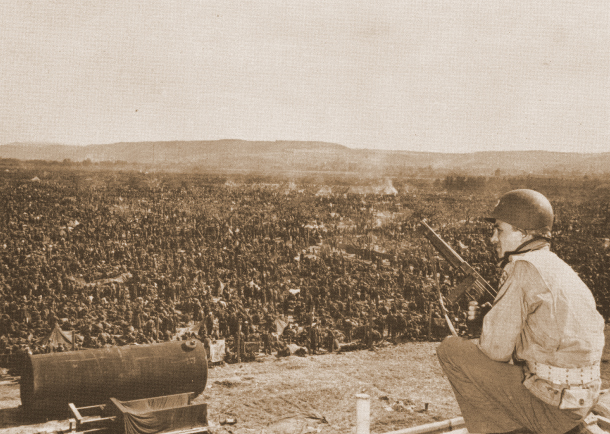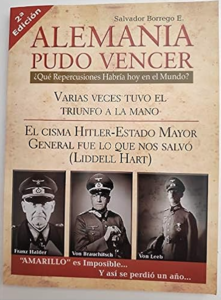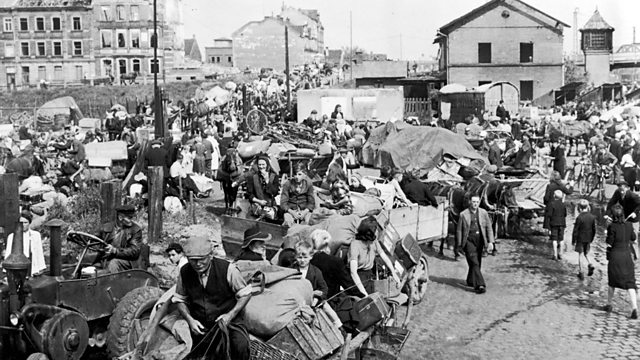 Editor’s Note: I spent Christmas Eve all alone. I don’t celebrate Christmas anymore. It is precisely that philosophical loneliness that makes me realise that the US has been the worst nation in the history of the West. Whoever murdered the defenceless men of the Reich in this way is, by necessity, the worst scum western history has ever produced. Thanks to the solitude of the cave and the tutelage of Bloodraven Goodrich, may he rest in peace, I was able to take a fleeting look at the last century as it happened. The former three-eyed raven wrote:
Editor’s Note: I spent Christmas Eve all alone. I don’t celebrate Christmas anymore. It is precisely that philosophical loneliness that makes me realise that the US has been the worst nation in the history of the West. Whoever murdered the defenceless men of the Reich in this way is, by necessity, the worst scum western history has ever produced. Thanks to the solitude of the cave and the tutelage of Bloodraven Goodrich, may he rest in peace, I was able to take a fleeting look at the last century as it happened. The former three-eyed raven wrote:
______ 卐 ______
“God, I hate the Germans,” wrote Dwight D. Eisenhower to his wife in 1944.
As Mrs. Eisenhower and anyone else close to the general knew, her husband’s loathing of all things German was nothing short of pathological. With the final German capitulation in May, 1945, the Allied commander found himself in control of over five million ragged, weary, but living, enemy soldiers. “It is a pity we could not have killed more,’’ muttered the general, dissatisfied with the body-count from the greatest bloodbath in human history. And so, Eisenhower settled for next best: If he could not kill armed Germans in war, he would kill disarmed Germans in peace. Because the Geneva Convention guaranteed POWs of signer nations the same food, shelter and medical attention as their captors, and because these laws were to be enforced by the International Red Cross, Eisenhower simply circumvented the treaty by creating his own category for prisoners. Under the general’s reclassification, German soldiers were no longer considered POWs, but DEFs—Disarmed Enemy Forces. With this bit of legerdemain, and in direct violation of the Geneva Convention, Eisenhower could now deal in secret with those in his power, free from the prying eyes of the outside world.
Even before war’s end, thousands of German soldiers who somehow escaped being murdered by the Americans when they surrendered and who actually did reach a POW camp, nevertheless soon died in captivity from starvation, neglect and, in many cases, outright murder. At one camp along the Rhine River in April 1945, each group of ten men were expected to survive in the open, on a plot of mud a few yards wide, in cold, wet weather, without shelter or blankets, with virtually no food. When the Americans finally “fed” the prisoners, it was one slice of bread that had to be cut ten ways, a strip for each man. A voice on the camp loud speaker arrogantly announced: “German soldiers, eat slowly. You haven’t had anything to eat in a long time. When you get your rations today from the best fed army in the world, you’ll die if you don’t eat slowly.” This mocking, murderous routine continued for three months. Once healthy prisoners soon became barely-breathing skeletons. Like clockwork, large numbers of dead were hauled away every day.
“The provision of water was a major problem,” revealed another witness, “yet only 200 yards away was the River Rhine running bank full.”
With the war still in progress, when the hard-pressed German leadership heard of these American atrocities they naturally appealed to the International Red Cross.
“If the Germans were reasoning like normal beings, they would realize the whole history of the United States and Great Britain is to be generous towards a defeated enemy,” came Eisenhower’s pompous reply. “We observe all the laws of the Geneva Convention.”
With German surrender and the threat of retaliation against Allied POWs entirely erased, deaths in the American concentration camps soared dramatically. While tens of thousands died of starvation and thirst, hundreds of thousands more perished from overcrowding and disease. As sixteen-year-old, Hugo Stehkamper, graphically described:
I only had a sweater to protect me from the pouring rain and the cold. There just wasn’t any shelter to be had. You stood there, wet through and through, in fields that couldn’t be called fields anymore—they were ruined. You had to make an effort when you walked to even pull your shoes out of the mud… It’s incomprehensible to me how we could stand for many, many days without sitting, without lying down, just standing there, totally soaked. During the day we marched around, huddled together to try to warm each other a bit. At night we stood because we couldn’t walk and tried to keep awake by singing or humming songs. Again and again someone got so tired his knees got weak and he collapsed.
The situation at American death camps near Remagen, Rheinberg and elsewhere, was typical. With no shelter of any sort, the men were forced to dig holes with their bare hands simply to sleep in.
At night, the prisoners would lower into the holes and try to stay warm by clinging to one another. And since it rained virtually every day, those holes that did not collapse always filled with water. Because of rampant diarrhea many of the victims were forced to defecate on the ground. Others were so weakened from sickness and starvation that they could not even lower their pants. Quickly, everyone’s clothes became infected with excrement and very soon, all the men suffered from chronic diarrhea. One camp “was nothing but a giant sewer, where each man just shit where he stood,” recounts a victim. Another enclosure was “literally a sea of urine” where prisoners were compelled to live and sleep. Even though the Rhine River flowed nearby, there was no water in most camps to drink, much less wash clothes in. As the prisoners rapidly weakened, many who fell into the numerous dug holes found it difficult or impossible to get out again without the help of others.
“Amputees slithered like amphibians through the mud, soaking and freezing. Naked to the skies day after day and night after night…,” remembered a witness.
When the camp commandant decided to feed the prisoners, generally every other day, the starved men read on the ration container that the amount was only one-tenth the normal daily diet fed US troops. One prisoner actually complained to a camp commander that the starvation diet was against the Geneva Convention.
“Forget the Convention,” snapped the American officer. “You haven’t any rights.”
As elsewhere, within days of enduring such deadly conditions many of those who had gone healthy into the Remagen camp were being dragged out the front gate by their heals and thrown onto a waiting truck.
“The Americans were really shitty to us,” a survivor at another camp recalled. “All we had to eat was grass.”
At Hans Waltersdorf’s prison, the inmates survived on a daily soup made of birdseed. “Not fit for human consumption,” read the words on the sacks. At another camp, a weeping seventeen-year-old stood day in, day out beside the barbed wire fence. In the distance, the youth could just view his own village. One morning, inmates awoke to find the boy dead, his body strung up by guards and left dangling on the wires. When outraged prisoners cried “Murderers! Murderers!” the camp commander withheld their meager rations for three days.
“For us who were already starving and could hardly move because of weakness… it meant death,” said one of the men.
Not enough that his American jailers were starving them to death; Eisenhower even forbade those on the outside from feeding the prisoners:
Under no circumstances may food supplies be assembled among the local inhabitants in order to deliver them to prisoners of war. Those who violate this command and nevertheless try to circumvent this blockade to allow something to come to the prisoners place themselves in danger of being shot.
Horrified by what they could see at a distance, heart-broken women from towns and villages surrounding the camps did indeed bring their own meager food stocks to share with the starving men. Good to his word, Eisenhower’s guards always chased the women and children away, scooped up the food, poured gasoline over it, then set the piles on fire. As warned, when some anguished women persisted, they were shot. After this murderous decree, anyone who insisted that the goal of the American general was anything less than the massacre of those under his control was simply one of those privy to the plan.
There was no lack of food or shelter among the victorious Allies.
Indeed, American supply depots were bursting at the seams. “More stocks than we can ever use,” one general announced. “They stretch as far as the eye can see.” Instead of allowing even a trickle of this bounty to reach the compounds, the starvation diet was further reduced. “Outside the camp the Americans were burning food which they could not eat themselves,” revealed a starving Werner Laska from his prison.
“When they caught me throwing C-Rations over the fence, they threatened me with imprisonment,” confided an angry American guard, Private Martin Brech. “One Captain told me that he would shoot me if he saw me again tossing food to the Germans… Some of the men were really only boys 13 years of age… or old men drafted by Hitler in his last ditch stand… I understand that average weight of the prisoners… was 90 pounds.”
As Brech noted, many of the prisoners were mere children. Some little boys were still clad in the same grimy pajamas the Americans had arrested them in. Fear that the children might form guerrilla groups was the official reason given.
Horrified by the silent, secret slaughter, the International Red Cross—which had over 100,000 tons of food stored in Switzerland—tried to intercede. When two trains loaded with supplies reached the camps, however, they were turned back by American officers. “These Nazis are getting a dose of their own medicine,” a prison commandant reported proudly to one of Eisenhower’s “political advisers.”
“German soldiers were not common law convicts,” protested a Red Cross official, “they were drafted to fight in a national army on patriotic grounds and could not refuse military service any more than the Americans could.”
Like this individual, many others found no justification whatsoever in the massacre of helpless prisoners, especially since the German government had lived up to the Geneva Convention, as one American official put it, “to a tee.”
“I have come up against few instances where Germans have not treated prisoners according to the rules, and respected the Red Cross,” wrote war correspondent Allan Wood of the London Express.
“The Germans even in their greatest moments of despair obeyed the Convention in most respects,” a US officer added. “True it is that there were front line atrocities—passions run high up there—but they were incidents, not practices; and maladministration of their American prison camps was very uncommon.”
Nevertheless, despite the Red Cross report that ninety-nine percent of American prisoners of war in Germany had survived and were on their way home, Eisenhower’s murderous program continued apace.
One officer who refused to have a hand in the crime and who began releasing large numbers of prisoners soon after they were disarmed was George Patton. Reasoned the general:
I emphasized [to the troops] the necessity for the proper treatment of prisoners of war, both as to their lives and property. My usual statement was… “Kill all the Germans you can but do not put them up against a wall and kill them. Do your killing while they are still fighting. After a man has surrendered, he should be treated exactly in accordance with the Rules of Land Warfare, and just as you would hope to be treated if you were foolish enough to surrender. Americans do not kick people in the teeth after they are down.”
Although other upright generals such as Omar Bradley issued orders to release POWs, Eisenhower quickly overruled them.
Mercifully, for the two million Germans under British control, Bernard Montgomery refused to participate in the massacre. Indeed, soon after war’s end, the field marshal released and sent most of his prisoners home.
After being shuttled from one enclosure to the next, Corporal Helmut Liebich had seen for himself all the horrors the American death camps had to give. At one compound, amused guards formed lines and beat starving prisoners with sticks and clubs as they ran the gauntlet for their paltry rations. At another camp of 5,200 men, Liebich watched as ten to thirty bodies were hauled away daily. At yet another prison, there was “35 days of starvation and 15 days of no food at all,” and what little the wretched inmates did receive was rotten. Finally, in June, 1945, Liebich’s camp at Rheinberg passed to British control. Immediately, survivors were given food and shelter and for those like Liebich—who now weighed 97 pounds and was dying of dysentery—swift medical attention was provided.
“It was wonderful to be under a roof in a real bed,” the corporal reminisced. “We were treated like human beings again. The Tommies treated us like comrades.”
Before the British could take complete control of the camp, however, Liebich noted that American bulldozers leveled one section of the compound where skeletal—but breathing—men still lay in their holes.
______________
Note of the Editor: Here you can request an item of the ‘Hellstorm Holocaust’ package (the biggest secret in modern history: the Allied genocide of Germans after 1945), and here you can order other books by Tom Goodrich (1947-2024).









